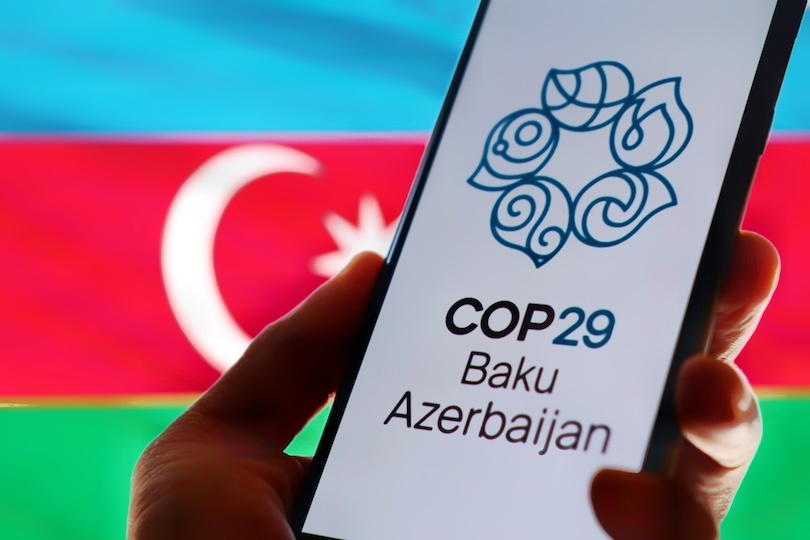Azerbaijan will host the COP29 climate conference in November. As preparations progress, Azerbaijani officials are meeting with partners and conducting “listening tours” to understand the issues that global leaders, institutions and communities want to address. In addition to the focus on climate change financing, water issues are also likely to be at the top of the agenda – with Washington becoming an important partner in the planning stages. An Azerbaijani delegation headed to Washington, D.C., in April, led by Mukhtar Babayev, Minister of Ecology and Natural Resources and Chairman of COP29. The delegation’s meetings included a visit to the Azerbaijani Embassy in the U.S. capital by former U.S. presidential climate envoy John Kerry. Azerbaijani delegation also participated in the spring meetings of the International Monetary Fund and the World Bank. At a March event organized by Axios, John Podesta, senior adviser to the president for international climate policy (who succeeded Kerry), explained: “We need to build on this momentum…especially by providing the necessary funding at the global level. .
While the full agenda for COP29 has yet to be announced, Baku has outlined a vision for the summit. At the Bonn Climate Change Conference in mid-June, COP29 President-elect Babayev explained the summit’s five initial priority areas: human capital, agriculture, urban environment, energy storage and finance, investment and trade. Babayev said climate change financing will be high on the agenda as Azerbaijan aims to secure “fair and ambitious new climate financing targets, finalize Article 6, strengthen global financial institutions and ensure the private sector is committed to climate action” . As for specific challenges, water security is expected to be one of the focus areas of activity. Access to water will be one of the defining factors of cooperation or conflict in the 21st century, as climate change, environmental destruction, greater reliance on water-intensive industries, population growth and inter-state tensions make access to this vital resource more difficult than ever. Gold is still important.
Having the COP in the Caucasus means that environmental issues, including water-related issues affecting the Caucasus and Central Asia, can be the focus of discussions. In the summer of 2021, Central Asia is experiencing drought, and water bodies in areas such as the Aral Sea and the Caspian Sea are in danger of disappearing. “We feel the impacts of climate change very much because [the Caspian’s] Levels are falling, and… we’re witnessing [this] every day. To me, this shows how fragile the environment around us is,” said Nigar Arpadarai, senior UN climate change advocate at COP29. Neighboring Iran, known for its authoritarian regime, also faces water shortages due to population growth, pollution, poor water management and treatment of minorities as second-class citizens, and this situation will continue to increase in the coming years. worsen further.
Other parts of the world also suffer from water shortages. On May 8, the United Nations Environment Program released an interview with Harald Egerer, Director of the UNEP Vienna Office. Egger explained how the Carpathian region, a mountain range that spans several countries in central and eastern Europe, has “become increasingly hotter over the past 50 years,” resulting in “more frequent and intense heat waves, droughts, Erratic rainfall and flooding. Drought increases risk of wildfires and pest outbreaks in the Carpathians Elsewhere in Europe, countries such as Italy and Spain continue to face drought, Politico Europe explains. The controversial opinion “put on hold a plan to strengthen the EU’s resilience to droughts and floods”.
As for the Western Hemisphere, Colombia, Costa Rica, Ecuador and Mexico are also currently experiencing drought. Insufficient rainfall has affected energy production in many countries, resulting in not only water shortages but also power curtailment schemes. Therefore, COP 29 must focus on water. It is rumored that Azerbaijan’s Caspian Sea neighbor Kazakhstan will co-host the “One Water” summit with France during the United Nations General Assembly in September this year. The summit takes place two months before COP29 in Baku, meaning water issues will be discussed extensively at this year’s high-level event. It is hoped that this meeting will lead to a “Blue Deal” to resolve water resources issues.
On the other hand, some countries have too much water due to rising sea levels. In May this year, Azerbaijani President Ilham Aliyev met with the Governor of Tuvalu, the Prime Minister of Tonga and the Foreign Minister of the Bahamas. Islands in the Pacific, Caribbean (and Maldives) are at risk of expansion due to rising sea levels.
It is unclear whether nuclear power will be a significant focus at COP29, but it is likely to be discussed. While nuclear power is an effective alternative to more polluting energy industries, it can also cause problems if the facility is not managed well. Furthermore, the geopolitics of nuclear energy must also be considered, given today’s tensions between global powers. In December 2023, Armenia and Russia signed a contract to modernize Armenia’s Metzamor Nuclear Power Plant (NPP), which will operate until 2036. within Russia’s sphere of influence. Additionally, there have been reports over the years that radioactive waste from the plant could affect neighboring settlements and farmland.
Unfortunately, an increasingly fragmented and violent global order means Azerbaijan’s COP29 presidency will face a difficult task in convincing global leaders from countries and industries to put aside their differences and focus on environmental cooperation and protection, including addressing climate change Financing and environmental issues. Given the current global geopolitical climate, Washington’s support is critical for Baku to achieve this near-impossible goal.
Further reading on electronic international relations

